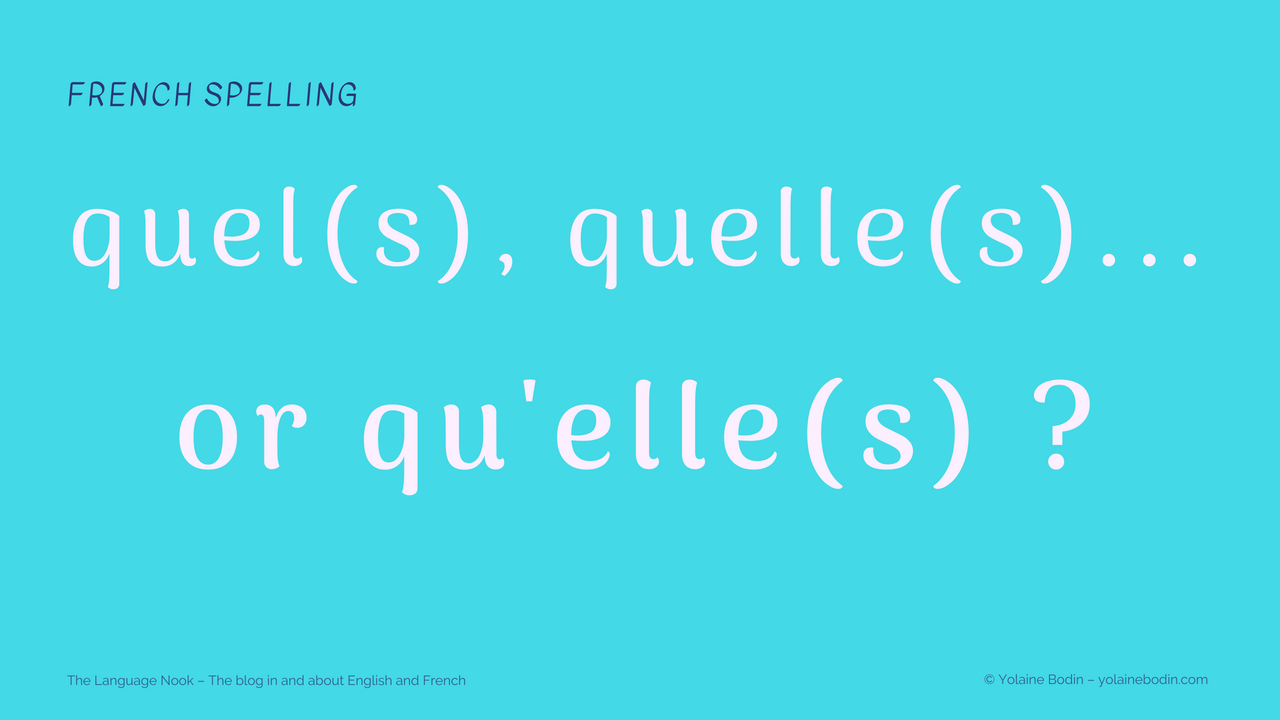Quel, quels, quelle, quelles, qu’elle or qu’elles ? You know you hear the sound [kel], but you are not sure how to spell it correctly?
The rule is quite simple actually: if you can say qu’il (singular) or qu’ils (plural) instead, then choose qu’elle (singular) or qu’elles (plural).
Remember these are contracted forms:
qu’il = que + il (that he)
qu’elle = que + elle (that she)
qu’ils = que + ils (that they, masculine form)
qu’elles = que + elles (that they, feminine form)
Look at these examples:
- Je sais qu’elle est là. (I know she’s here) → Je sais qu’il est là. (I know he’s here)
- Je crois qu’elles veulent partir.(I think they want to leave, they being all females) → Je crois qu’ils veulent partir. (I think they want to leave.)
In any case where you can’t replace it by qu’il or qu’ils, it means you need to write quel in one word. However, remember quel has to agree with the noun it represents or accompanies:
- Quel + masculine singular noun: Quel âge as-tu ? (How old are you? – the noun “âge” is masculine)
- Quelle + feminine singular noun: Quelle joie ! (What a joy! – the noun “joie” is feminine)
- Quels +masculine plural noun: Quels chanteurs aimez-vous écouter ? (Which singers do you enjoy listening to? – the word “chanteur” is masculine)
- Quelles+ feminine plural noun: Est-ce que tu sais quelles fleurs elle aime ? (Do you know which flowers she likes? – the word “fleur” is feminine)
Let’s look at this sentence where we hear [kɛl] twice and let’s try to replace it by qu’il:
- Quelles sont les fleurs qu’elle préfère ? →
qu’ilssont les fleurs qu’il préfère ?
We can’t replace the first one by qu’ils, it doesn’t make sense. In that case, we need to spell it in one word and we choose quelles because [kɛl] describes the flowers –fleurs–, the noun is feminine plural.
However we can replace the second one by qu’il, so we choose the spelling in two words: qu’elle.
Careful! If you use a comparative, remember that qu’elle can mean than her, as in this example:
- Il est plus grand qu’elle. (He’s taller than her)
In this case, the masculine equivalent would be que lui. For example:
- Elle est plus grande que lui. (She’s taller than him)
In the same way, qu’elles can mean than them, and in the plural form, the masculine is qu’eux:
- Ils sont moins âgés qu’elles (They’re younger than them –feminine.Here the masculine would be: Ils sont moins âgés qu’eux.).
Memo:
If I can say qu’il (singular) or que lui instead, I’ll write qu’elle
If I can say qu’ils (plural) or qu’eux instead, I’ll write qu’elles
Otherwise, I’ll spell quel(s) or quelle(s), choosing the correct agreement with the noun (masculine or feminine and singular or plural).
Would you like to practice? Try the exercise below!
Choose the correct spelling: quel, quels, quelle, quelles, qu’elle, qu’elles
There you are! You now know how to choose between quel(s), quelle(s) and qu’elle(s). Congratulations! 😉





Loved the quiz to test my understanding!
Glad to hear! I hope you’re happy with the score you got 🙂
I missed the first two 🙁
Try again! You can try the quiz the number of times you like, and the questions never come in the same order! 😉
Ok